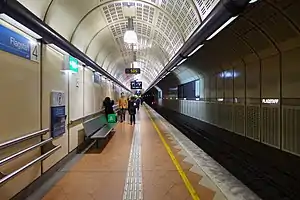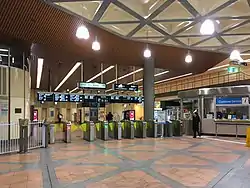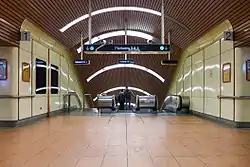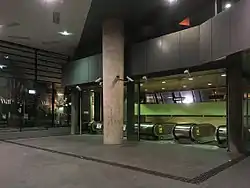Flagstaff railway station
Flagstaff railway station is an underground station on the metro network in Melbourne, Australia. It is one of five stations (and one of three underground) on the City Loop, which encircles the Melbourne CBD. The station takes its name from the nearby Flagstaff Hill, a significant site in Melbourne's early history, and services Melbourne's legal district. It runs under La Trobe and William Streets, near the north western corner of the CBD.
Flagstaff | |||||||||||||||||||||||||||||||||||||||||||||||||||||||||
|---|---|---|---|---|---|---|---|---|---|---|---|---|---|---|---|---|---|---|---|---|---|---|---|---|---|---|---|---|---|---|---|---|---|---|---|---|---|---|---|---|---|---|---|---|---|---|---|---|---|---|---|---|---|---|---|---|---|
| Commuter rail station | |||||||||||||||||||||||||||||||||||||||||||||||||||||||||
 Flagstaff railway station Platform 4 (2017) | |||||||||||||||||||||||||||||||||||||||||||||||||||||||||
| Location | La Trobe Street, Melbourne | ||||||||||||||||||||||||||||||||||||||||||||||||||||||||
| Coordinates | 37°48′43″S 144°57′22″E | ||||||||||||||||||||||||||||||||||||||||||||||||||||||||
| Owned by | VicTrack | ||||||||||||||||||||||||||||||||||||||||||||||||||||||||
| Operated by | Metro | ||||||||||||||||||||||||||||||||||||||||||||||||||||||||
| Line(s) | Alamein (weekday pre-peak and post-peak only) Belgrave Craigieburn Cranbourne Glen Waverley Hurstbridge Lilydale Mernda Pakenham Sunbury Upfield | ||||||||||||||||||||||||||||||||||||||||||||||||||||||||
| Platforms | 4 (2 island) | ||||||||||||||||||||||||||||||||||||||||||||||||||||||||
| Tracks | 4 | ||||||||||||||||||||||||||||||||||||||||||||||||||||||||
| Construction | |||||||||||||||||||||||||||||||||||||||||||||||||||||||||
| Structure type | Underground | ||||||||||||||||||||||||||||||||||||||||||||||||||||||||
| Depth | 32 m[1] | ||||||||||||||||||||||||||||||||||||||||||||||||||||||||
| Platform levels | 2 | ||||||||||||||||||||||||||||||||||||||||||||||||||||||||
| Disabled access | Yes | ||||||||||||||||||||||||||||||||||||||||||||||||||||||||
| Other information | |||||||||||||||||||||||||||||||||||||||||||||||||||||||||
| Status | Premium station | ||||||||||||||||||||||||||||||||||||||||||||||||||||||||
| Station code | FGS | ||||||||||||||||||||||||||||||||||||||||||||||||||||||||
| Fare zone | 1 | ||||||||||||||||||||||||||||||||||||||||||||||||||||||||
| Website | Public Transport Victoria | ||||||||||||||||||||||||||||||||||||||||||||||||||||||||
| History | |||||||||||||||||||||||||||||||||||||||||||||||||||||||||
| Opened | 27 May 1985 | ||||||||||||||||||||||||||||||||||||||||||||||||||||||||
| Electrified | Yes | ||||||||||||||||||||||||||||||||||||||||||||||||||||||||
| Passengers | |||||||||||||||||||||||||||||||||||||||||||||||||||||||||
| 2008–2009 | 4.188 million[2] | ||||||||||||||||||||||||||||||||||||||||||||||||||||||||
| 2009–2010 | 4.364 million[2] | ||||||||||||||||||||||||||||||||||||||||||||||||||||||||
| 2010–2011 | 4.554 million[2] | ||||||||||||||||||||||||||||||||||||||||||||||||||||||||
| 2011–2012 | 4.982 million[2] | ||||||||||||||||||||||||||||||||||||||||||||||||||||||||
| 2012–2013 | Not measured[2] | ||||||||||||||||||||||||||||||||||||||||||||||||||||||||
| 2013–2014 | 4.581 million[2] | ||||||||||||||||||||||||||||||||||||||||||||||||||||||||
| 2014–2015 | Not measured[3] | ||||||||||||||||||||||||||||||||||||||||||||||||||||||||
| 2015–2016 | 4.38 million[3] | ||||||||||||||||||||||||||||||||||||||||||||||||||||||||
| 2016–2017 | 4.65 million[3] | ||||||||||||||||||||||||||||||||||||||||||||||||||||||||
| 2017–2018 | 4.75 million[3] | ||||||||||||||||||||||||||||||||||||||||||||||||||||||||
| Services | |||||||||||||||||||||||||||||||||||||||||||||||||||||||||
| |||||||||||||||||||||||||||||||||||||||||||||||||||||||||



In 2017/18, it was the sixth busiest station on Melbourne's metropolitan network, with 4.75 million passenger movements.[3] Flagstaff station commenced opening on weekends and public holidays from 1 January 2016[4][5] – it was previously the only station in Melbourne to be closed on weekends and public holidays due to its proximity to business-related buildings such as the Commonwealth Law Complex, banks and major office buildings.
History
The station was constructed by mining methods, and has four levels to a maximum depth of 32 metres. The site was a geological "sandwich" of basalt in the arch area, Silurian mudstone bedrock in the lower half, and silt in the middle, which precluded the construction of lower and upper platforms as separately driven tunnels.[6]
Instead, the station platforms consist of two chambers linked by cross tunnels, each having two platforms on top of each other. The side of each chamber was made up of two drift tunnels, one at the top and one at the bottom. These were then linked together by 228 vertically raise bored shafts, 1 metre in diameter and 3 metres apart. The shafts and drifts were then filled with concrete, and formed the side skeleton of the station chambers. The arch of each chamber was then constructed underground across the top of the two side walls, the material below the arch excavated down to the bottom of the side walls, and temporary cross struts added between the raise bored columns until the permanent elements were added. This innovative method resulted in a $1 million saving in construction costs (in 1975 dollars).[7]
Flagstaff was the last station on the loop to open. Although trains had run through the station site since 24 January 1981 when the City Loop began operating, Flagstaff only opened to passengers on 27 May 1985.[8] Initially, the City Loop did not operate at all on Sundays. That was changed with the introduction of Sunday trading, but at the same time that the other two underground loop stations opened on Sundays, Flagstaff station had its Saturday services cancelled.[9]
In May 2017, CDC Melbourne operates one route 605 to Gardenvale from Flagstaff Station.
Facilities
The station is located under the intersection of La Trobe Street and William Streets and has two entrances - via lift or escalator south of La Trobe Street, and by stairs on the north. Flagstaff has three underground levels. The concourse level has a ticket office, ticket operated gates, toilets, a news stand and a hot snack shop. Flagstaff's four platforms are on the two levels below, with each level having an island platform. The levels are linked by elevators, 14 escalators and stairs.[7] The four platforms serve a separate group of rail lines that leave the loop and radiate out into the city's suburbs.
Weekend opening campaign
In October 2012 it was revealed that traders and residents in the north-west area of the Melbourne CBD had begun a campaign to have Flagstaff station opened on weekends, arguing that its closure had a deadening effect on the life of the area. A petition calling for the station's weekend opening, only collected about 150 signatures in the first week.[9]
With a number of residential developments having been built, the station was scheduled to open on weekends from June 2015, with both political parties having committed to this in the 2014 State Government Election.[10] This was however deferred until January 2016.[4][5]
Transport links
| Nº | Between | and | Stop location |
|---|---|---|---|
| 30 | St Vincent's Plaza | Etihad Stadium | La Trobe Street |
| 35 | The District Docklands SC | The District Docklands SC | La Trobe Street |
| 58 | West Coburg | Toorak | William Street |
Platforms & services
Platform 1 - Clifton Hill Group:
- Mernda line: all stations and limited stops services to Mernda
- Hurstbridge line: all stations and limited stops services to Hurstbridge
Platform 2 - Caulfield Group:
- Pakenham line: express services to Pakenham
- Cranbourne line: express services to Cranbourne
Platform 3 - Northern Group:
- Craigieburn line: all stations services to Craigieburn
- Upfield line: all stations services to Upfield
- Sunbury line: all stations and limited stops services to Sunbury
Platform 4 - Burnley Group:
- Lilydale line: all stations and limited stops services to Lilydale
- Belgrave line: all stations and limited stops services to Belgrave
- Glen Waverley line: all stations and limited stops services to Glen Waverley
- Alamein line: weekday shoulder peak all stations and limited stops services to Alamein
References
- History of Melbourne's Metropolitan Rail System and the adoption of the Underground Rail Loop concept Metropolitan Transit Authority
- "Train Station Patronage FY2008-2014". Public Transport Victoria. 14 May 2015. Archived from the original (XLS) on 30 March 2016. Retrieved 1 November 2016. (access from Archived 3 November 2016 at the Wayback Machine)
- "Station Patronage Data 2013-2018". Philip Mallis. Transport for Victoria. Retrieved 4 November 2019.
- Gough, Deborah; Dmytryshchak, Goya (28 November 2015). "Countdown to Flagstaff Station opening on weekends". Fairfax Media. Retrieved 3 December 2015.
- "Flagstaff Station to open on weekends in under a month". Public Transport Development Authority (Public Transport Victoria). 8 December 2015. Retrieved 18 December 2015.
- "The Melbourne Underground Railway Loop". Technology in Australia 1788-1988. www.austehc.unimelb.edu.au. p. 383. Retrieved 20 July 2008.
- History of Melbourne's Underground Rail System Metropolitan Transport Authority
- Department of Infrastructure. "Public transport - City Loop history". www.doi.vic.gov.au. Archived from the original on 20 May 2009. Retrieved 20 July 2008.
- Carey, Adam (23 October 2012). "Push for Flagstaff to open 7 days". The Age. Retrieved 23 October 2012.
- "Flagstaff station to open on weekends" Railway Digest November 2014 page 24
External links
 Media related to Flagstaff railway station at Wikimedia Commons
Media related to Flagstaff railway station at Wikimedia Commons- Melway map at street-directory.com.au